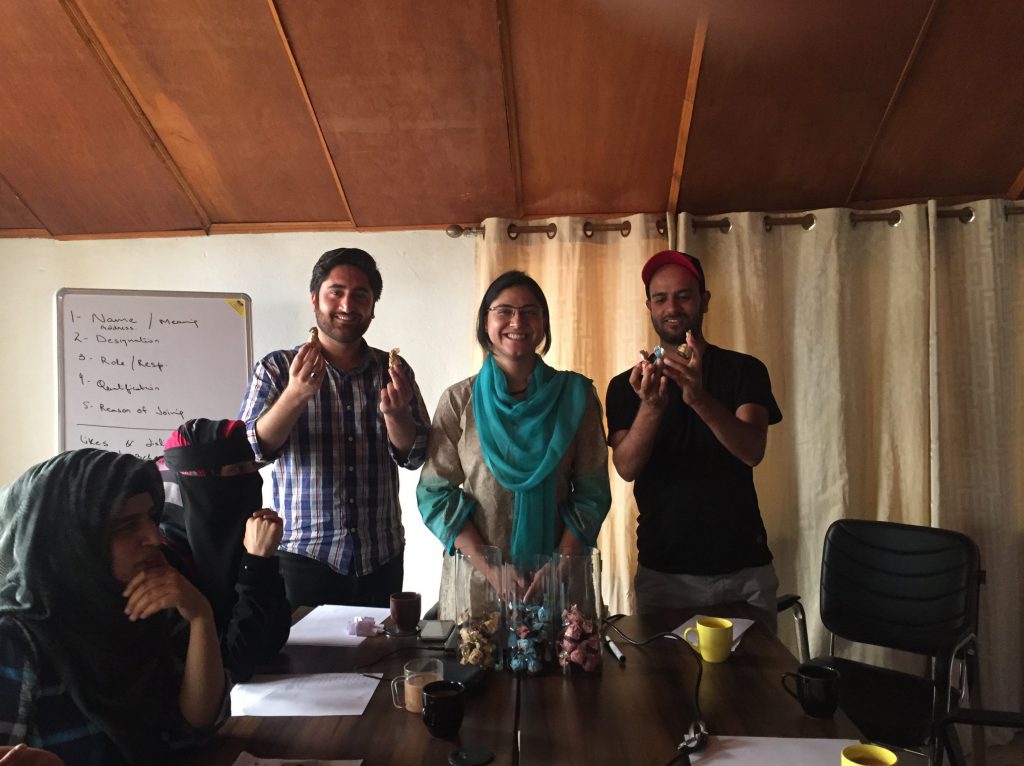Blog, Inspiring Kashmiris
Meet Sanna Masood – MD & CEO (Post-Harvest) at Farm2U
Tell us about yourself?
I, Sanna Masood, born and brought up in Kashmir – did my Bachelors in Biotechnology followed by MBA, from Delhi. In early 2008, I kick-started my career; with FabIndia Overseas Pvt. Ltd, Delhi – as a Senior Executive in Systems Protocols & Planning. After a satisfying work experience, I returned to my native place – instilled by the thought of accomplishing something for my people.
In Kashmir, I worked in various organizations, under various capacities, including – Consultant with INTACH-J&K Chapter, Craft Development Institute, Asian Heritage Foundation, The Global Education & Leadership Foundation, and J&K Bank, among others. Having gained experience in corporate strategy and planning, business development, and monitoring; in areas of grass-roots engagement, microfinance, specialized agricultural lending, financial services, rural development, and livelihood clusters – I, in 2012, founded my consulting firm: SEED Solutions. Soon it became Kashmir’s first women farmers’ collective of 70 members; starting with Anantnag District. However, despite a sound marketing plan and envisioned hope – the deluge of 2014, proved to be an unbearable setback for the project. Then, in late 2014, I joined the Farm2U group as a Director and contributed to the growth of the group as the Chief Strategist. In 2015, I also assumed charge as the CEO of Farm2U’s Post-Harvest division, and currently; I am the Director & CEO of the Post-Harvest division at Farm2U – a conglomerate, running one of India’s largest integrated Cold Storage facilities. We are a decade-old enterprise; which has introduced the first and the largest network of integrated cold chain services for the farmers of Jammu and Kashmir. Its current capacity of 30,000 + MT (Cold Storage/Controlled Atmospheric facility) with automatic Grading and Packing Lines; is spread over 3 districts in the Kashmir valley (Pulwama, Anantnag & Baramulla), and connected through a fleet of refrigerated trucks. In addition to this, we also have a marketing and distribution network, spread across India; to ensure marketing support for our growers.
I would also like to add that in 2021 – I rejuvenated Seed Solutions; as a platform for empowering women. Within its first months of rebirth – we have provided women – in the Tumlahal area of Pulwama; with support – in terms of both land and capital, as well as training for growing safe food, hygienic processing techniques, providing a window to the markets, and financial literacy, and raising awareness about their rights – besides, collectivizing these women farmers in groups, for mutual aid and help.

What steps have you taken to increase the awareness and how have farmers been responding to you?
One of the major and daunting tasks for us; has always been to reach the farmers – the intended beneficiaries and partners of our vision. Essentially, we let our work do the talk – Despite enormous hurdles; we stayed afloat; generating growth, prosperity, and economic freedom. What started as a vision, a long term dream of our founder Mr.Khurram Shafi Mir has now become a reality – for everyone to see – Thousands of farmers are now associated with the company, storing their produce in 4 different facilities: Harshna Naturals Pvt. Ltd. (HN) and HN Agri Serve Pvt. Ltd. (HNAS) – both located at Lassipora, Pulwama, HN Agri-Chain Pvt. Ltd. (HNAC) – located at Sopore, Baramulla and Gruess Agri Serve Pvt. Ltd.(GASP) – located at Achhabal, Anantnag. Besides, two new facilities, of 5,000 MT each, would soon be added to this cluster of stores – taking the storage capacity of the group to 40,000 MT. Besides, farmers have shown trust in us, by availing our other facilities, including our packing and marketing spectra.
As we let our work speak for us – we are also utilizing various sources of mass media- From the platforms on social media to the traditional print and electronic media – we are increasing our footprint; to put forward both our vision and achievements.
What challenges are you facing in this field?
Apple plantation in the State suffers from inherent constraints of remoteness and inaccessibility, marginality and fragility in terms of moisture stress, poor soil conditions, and a short growing season. Added to this, are the socio-economic constraints, including small landholdings, poor productivity, poor production management, labor shortages, poor post-harvest management, poor market networks, and lack of entrepreneurship. To overcome these, and invent a new apple production and storage system has been a major challenge – which includes various components i.e., rootstocks, training methods, tree density, irrigation, storage parameters, transportation, etc. like the pieces of a jigsaw puzzle, must each be addressed carefully to make sure they all fit together. Only when pieced together will a plan be complete for a new apple production and storage system.
Besides these technical aspects – there also arise the socio-psychological facets to the problem. The inertia of habit, the skepticism for innovation, and the hindrance from vested interests; have all created major obstacles in our pathway. Nature, as well, has not been very generous – with the pandemic of covid-19 striking us hard. But, against all the odds – we have been fairly successful in pursuing; what we believe was the right course.
How can we strengthen this field in Kashmir?
Broadly speaking, we need general protocols to be followed for best storage of the existing varieties of apples – Red Delicious, Ambri Kashmiri, American Trel (American Apirouge), Maharaji (White Dotted Red), Hazratbali (Benoni), and Golden Delicious – such as temperature, humidity, oxygen, and the carbon-dioxide levels – during storage.
Secondly, storage and transportation capacity of the new high-yielding apple varieties – Fuji, Gala, Red Delicious, Green Apple, etc. also needs a major boost. The apple industry would require protocols to be followed for best storage of the new high yielding varieties of apple, which again includes temperature, humidity, oxygen and, the carbon-dioxide levels – during storage.
Thirdly, quality control of apples in storage is of paramount importance – Besides management, it also requires control of major storage ailments; such as bitter pit, water core, scalds, etc. in the existing, as well as the newly introduced varieties.
It is precisely here, where we – as Farm2U, decided to play our role. To invigorate this field – a hectare of whose orchard generates 400-man days annually, with 3.3 million persons, being directly or indirectly dependent on it for livelihood – We provided the farmers a platform for personal empowerment and growth; through best agro-techniques, methodologies and principles.
Here, I would add that the Post Harvest interventions cannot act as a panacea; to all the ailments, faced by our horticulture. The traditional varieties of apple, grown in our traditional orchards, have a very low yield of around 10 MTs/Ha, far less than the global average yield of 50-70 MTs/Ha. Even, out of this produce, a mere 35% qualifies for high quality, as opposed to Europe, which produces nearly 80% high-quality fruit. As such, interventions at the Pre-Harvest levels are equally important. Keeping this in mind, our Pre-harvest business division headed by Mr. Khuram Shafi Mir, having majored in Industrial Engineering and Operations Research – set up the High Density Orchard venture – which provides the farmer with a single stop platform for High-Density Plantations (HDP); which provides you with the installation of High-Density Orchards – resulting in a 3 times reduction of waste, 4 times improvement in the quality of produce, 5 times decreased use of water, 6 times increased fruit production, 7 times decrease in pesticide usage and an 8 times increase in returns.
Interview by
Durdanah Masoodi

